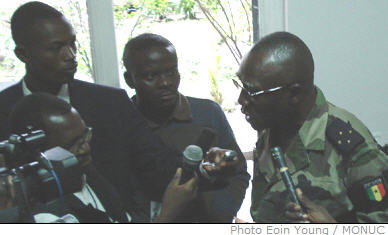 At the weekly MONUC press conference in Kinshasa on Wednesday 17 October 2007, MONUC force commander General Babacar Gaye reiterated MONUC's mandate, as the DRC government seeks to establish its authority in troubled North Kivu province.
At the weekly MONUC press conference in Kinshasa on Wednesday 17 October 2007, MONUC force commander General Babacar Gaye reiterated MONUC's mandate, as the DRC government seeks to establish its authority in troubled North Kivu province.
General Gaye explained that in Masisi territory during the course of an evacuation of FARDC wounded by MONUC during the recent clashes, the local population began throwing stones at the blue helmets.
“This equates to incomprehension of the nature of our action by the local population. I also received a report yesterday that FARDC soldiers arriving into Goma had a less than friendly attitude towards our troops,” the General explained.
He went on to say that MONUC’s mandate was very clear, with the priority of ensuring the security of the local population.
“In North Kivu we have deployed Mobile Operating Bases, we escort the humanitarian convoys, and we are close to the displaced camps. In this regard our action is quiet and permanent.”
In addition, General Gaye said that MONUC’s mandate is to give support to the unfolding political process, and to support the DRC Armed Forces (FARDC).
“We give advice and assistance to the FARDC. MONUC supports the FARDC in North Kivu with air reconnaissance, and air transport for munitions, troops and the evacution of wounded. The towns of Goma and Sake are also protected by MONUC.”
He underlined that it’s the duty of the international community in a crisis situation to recommend a peaceful solution to all parties.
“MONUC is a peacekeeping force and our preferred option is that the combatants enter brassage immediately without conditions in a peaceful manner. If this does not happen, it is clear that there is an elected government, which has a duty to protect the population. It is not the responsibility for anyone other than the legal government of this country.”
General Gaye concluded by saying it is necessary to give a peaceful solution every possible chance to be implemented.
“It is not a weakness by any side to give a chance to a peaceful solution, it’s in the interests of the population who are the priority in this situation. To give a peaceful solution a chance, communication needs to be improved, and it is necessary to multiply the kinds of actions that call people to reason.”
Related articles
- • Tshisekedi Announces Government of National Unity and Calls for Unity Against M23 Rebels (February 23, 2025)
- • UN Security Council Calls on Rwanda to Stop Supporting M23 Rebels in DR Congo (February 22, 2025)
- • DR Congo Citizens Head to Polls to Elect President, Members of Parliament (December 20, 2023)
- • At least 30 dead after massacres in Ituri (March 2, 2018)
- • Political tensions 'running high' in DR Congo ahead of 2016 elections (October 7, 2015)
- • DRC Army Putting Pressure on FDLR (April 1, 2015)
- • New DR Congo amnesty law welcomed by UN envoys (February 5, 2014)
- • Colonel Mamadou Ndala Is Killed in Ambush (January 2, 2014)
- • No 'Peace Deal' With Defeated M23 Rebels, DR Congo Says (November 11, 2013)
- • Congo Will Not Sign a 'Peace Deal' With Defeated M23 Rebels, Government Says (November 6, 2013)
- • Congo Army Takes Control of Mbuzi Hill From M23 Rebels (November 4, 2013)
- • Kabila Congratulates Congo Army for Defeating M23 Rebels (October 30, 2013)
- • Advancing Congo Troops Take Control of Rumangabo From M23 Rebels (October 28, 2013)
- • Congo Army Liberates Rutshuru, Kiwanja and Kibumba From M23 Rebels (October 27, 2013)
- • Congo Army Dislodges M23 Rebels From Strategic Town of Kibumba (October 26, 2013)
- • Ban Ki-moon Confirms M23 Rebels Shelled Rwanda (August 31, 2013)
- • DR Congo Will Defend Itself Against an Attack by Rwanda, Government Says (August 31, 2013)
- • M23 Rebels Fired Shells Into Rwanda, Not Congo Army, UN Says (August 30, 2013)
- • Mortar Shells From Rwanda Kill Civilians in Eastern Congo (August 23, 2013)
- • Dozens of M23 Rebels Killed by Congo Army in Renewed Fighting (August 22, 2013)
- • UN Peacekeepers Start Enforcing Security Zone in Eastern Congo (August 1, 2013)
- • UN Security Council debate focuses on peace efforts for Africa's Great Lakes region (July 25, 2013)
- • M23 Rebels Said to Flee Rumangabo After Congo Army Airstrikes (July 25, 2013)
- • Congo Army Strikes M23 Rebels Base At Rumangabo (July 24, 2013)
- • M23 Rebels in Disarray in Eastern Congo, Says Government Spokesman (July 19, 2013)
- • 120 M23 Rebels Killed in East, Government Says (July 15, 2013)
- • U.S. Sanctions M23 Rebel Leaders (December 18, 2012)
- • Thousands of Women March Against M23 Rebels in Kinshasa (November 24, 2012)
- • DR Congo Officials Vow to Defend Goma Against M23 Rebels (November 19, 2012)
- • Congo Government Says Bosco Ntaganda Rebels Trained in Rwanda (June 10, 2012)
Tags: |







